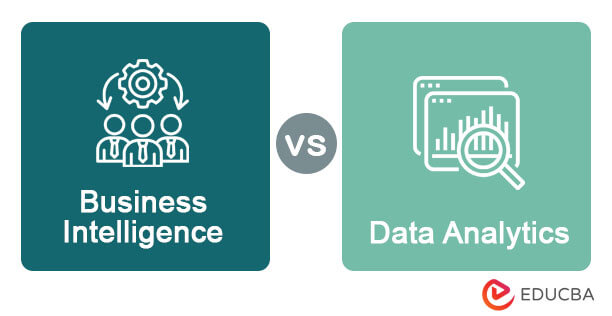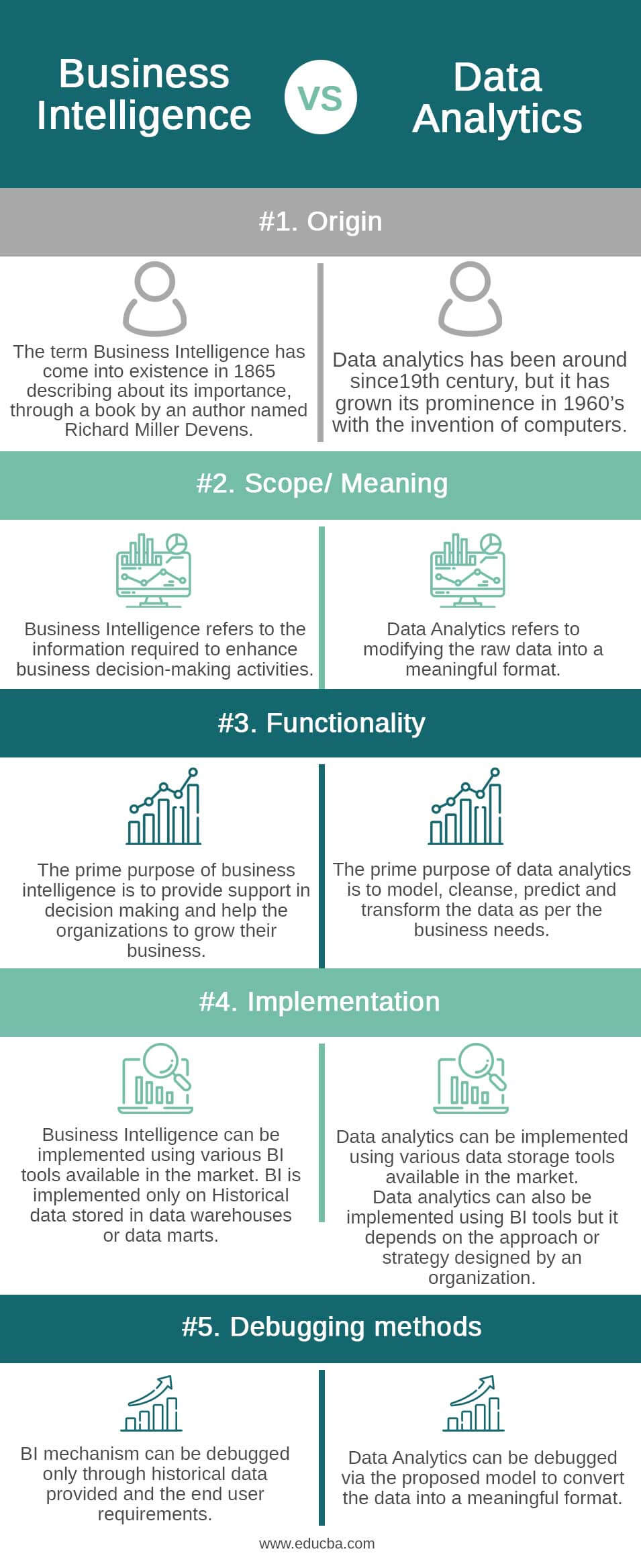Difference Between Business Intelligence and Data Analytics
Business Intelligence deals with complex strategies and technologies that help end-users analyze the data and perform decision-making activities to grow their business. BI plays a key role in business data management and performance management. The transformed information can be utilized to cleanse, transform or model the data to support the process of decision-making, derive conclusions, and implement predictive analytics.
Head to Head Comparison Between Business Intelligence vs Data Analytics (Infographics)
Below is the Top 5 Comparision Between Business Intelligence vs Data Analytics.
Key Differences Between Business Intelligence vs Data Analytics
- Devens uses the term BI (Business Intelligence) to describe how a banker named Sir Henry Furness has gained profit by analyzing his own environment to stay ahead of his competitors.
- Data Analytics or Business Analytics is a process that helps enterprise users to transform raw or unstructured data into a meaningful format.
- Business Intelligence is implemented across many organizations to enhance their decision-making capabilities, analyze business data, perform data mining, develop reports, and improve operational capabilities. BI is implemented only on historical data stored in the Data Mart or Data warehouses. Some of the business operations, such as cleansing the data, modeling the data, transforming the data, and forecasting future data trends, are the key aspects of implementing data analytics.
- Data Analytics helps business users in analyzing historical data and current data and predicting future trends to make the right changes in the proposed business model. BI helps users to identify the loopholes in managing the data and rectifies them by providing efficient decision-making scenarios.
- Reporting is a key feature that can be implemented with the help of Business Intelligence and Data Analytic tools. But, the reporting or visualizations developed vary based on the type of business data and business scenarios. If there is a business scenario where the client must deal with current-day market trends and generate ad-hoc reports, then data analytics would be the right option. Data Analytics can also be preferred when there is a need for businesses to forecast future trends of data based on past data.
Comparison Table
| Basis of Comparison |
Business Intelligence |
Data Analytics |
| Origin | The term Business Intelligence came into existence in 1865, describing its importance in a book by an author named Richard Miller Devens. | Data analytics has around since19th century, but it has grown its prominence in the 1960s with the invention of computers. |
| Scope/ Meaning | Business Intelligence refers to the information required to enhance business decision-making activities.
|
Data Analytics refers to modifying the raw data into a meaningful format. |
| Functionality | The prime purpose of business intelligence is to provide support in decision-making and help organizations grow their business. | The prime purpose of data analytics is to model, cleanse, predict, and transform the data as per the business needs. |
| Implementation | Business Intelligence can be implemented using various BI tools available in the market. BI is implemented only on Historical data stored in data warehouses or data marts.
|
Data analytics can be implemented using various data storage tools available in the market. Data analytics can also be implemented using BI tools, but it depends on the approach or strategy designed by an organization. |
| Debugging methods | BI mechanism can be debugged only through historical data provided and the end user requirements. | Data Analytics can be debugged via the proposed model to convert the data into a meaningful format. |
Conclusion
In conclusion, we have seen the origins, head-to-head comparisons, and some key differences between Business Intelligence and Data analytics. Considering the current day technology market trends, there has been an evolution in developing business intelligence and data analytic tools. It depends on the enterprise users to choose based on their business scenarios. Going by the current data trends, both Business Intelligence and Data Analytics have a key role to play in business growth.
Recommended Article
This has been a guide to Business Intelligence vs Data analytics, their Meaning, Head to Head Comparison, Key Differences, Comparision Table, and Conclusion. You may also look at the following articles to learn more –


